Today’s question: can dogs eat pistachios? Are pistachios good or bad for dogs? Scroll down for detailed answers.
As dog owners, we need to be careful about the food we feed to our dogs. It is important to keep our dogs safe, happy, healthy, and free from harm. Now, when it comes to their meals, we sometimes tend to give them some of our food as treats. Blending human food or leftovers into your dogs kibble seems like a good idea, and can often help boost the nutritional intake of your pup. Offering human food as treats is often seen as a healthier alternative to offering cookies and biscuits. This is true in some cases, but not all. Human food is not technically created for canine consumption. Offering the food to your dog should only be chosen after research is made, you have spoken with your vet, and you have analyzed your dog for potential side effects due to the size, breed, and temperament.
We sometimes give our dogs whatever we can find in our kitchen. But, are the foods we humans eat as good for the dog as it is for us? Dogs tend to eat nuts, and enjoy peanut butter; do dogs eat food from the nut family? For example, can dogs eat pistachios? Let’s see what the specialists’ opinion in dogs and pistachios are in regards to this matter.
Can Dogs Eat Pistachios? Why Not?
Pistachios are not recommended for dogs.
There are many foods created for humans that contain pistachios as a main or side ingredient. You may even enjoy a certain dish regularly and have no idea that the dish contains pistachios. With the popularity of this ingredient in many foods, we may begin to wonder if dogs too can enjoy this tasty nut. If a food is ‘made’ for a human and ‘enjoyed’ by the dog, is the food safe to offer dogs?
Before offering human food to your dog, you must speak to a vet and read reports from a reputable source on the topic of feeding food to dogs. A vet will be the greatest sense of knowledge, not only on the dog, but on the type of food your particular dog has the ability to digest. Your vet, or a reputable written source, may also be able to outline certain ingredients in foods that may cause harm to your dog.
Some human foods from the nut family are safe to feed to your dog. According to experts, pistachios are not recommended for dogs. The pistachio may not be toxic for the canine species, but the nuts are definitely soaked into fats that have the potential of causing a lot of issues. While the nut itself is not the issue, the fat surrounding the nut is. On occasion, there are foods that are deemed safe for dogs to enjoy as they are in itself, but the fat content, cholesterol, or salt content are what makes the food off limits for a pup.
Just as we as dog owners must take care of our health and watch our fat, sugar, and salt levels, dogs must do this as well. Since a dog does not know (or care) of the high fat content in a pistachio, you must be the one to keep the nut away from your dog.
Removed from their shells, an occasional pistachio is not likely to be a problem for your pet, but we would not recommend feeding him a significant amount of these nuts. Using a nut or two as a treat for training will not dramatically increase the fat content of your dog, but offering to your pup for every training exercise and on every occasion, will increase the fat content.
Rather than offering a pistachio for training, you may begin to think of safe veggies to offer that are low in calories and sugar and may have beneficial nutrients. Adding a healthy food to the diet of your dog is important, even during training. Substituting a veggie for a nut will benefit your dog in the long run.
Also, do not give dogs pistachios that are still inside the shell, dogs cannot easily digest pistachio shells. Dogs can choke on the shells and the shell may become lodged in the intestine. These shells can cause digestive blockages that can be dangerous for your dogs as well. Shells may also become caught in between the teeth of your dog, or be stuck around the gum line. If you do not brush the teeth of your dog, the shell can cause pain and potential erosion of the tooth, thereby leading to a host of dental issues.
Shells from any food should not be eaten or swallowed by a dog. In the event your dog has eaten a bunch of pistachios without your consent, be sure to check his/her teeth for residue, watch for potential choking and blockages, and call your vet right away. You may also need to lower their treat quantity in the future to balance the amount of fat your dog may have ingested when raiding the pistachio jar.
Can Pistachios Bring any Benefits to Dogs?
Well, we know that in the case of humans, pistachios are extremely beneficial. They have a wonderful taste, are easy to find, and easy to enjoy. Pistachios are often brought to sporting events, used on car trips, and brought in bagged lunches due to their wonderful portability.
Pistachios may also be good treats for dogs since their owners are able to transport the nut in a small bag, or in the pocket, making treat dispensing easy along a walk or run with a pup. While pistachios are great for portability and ease of use, the nut may be great for humans, but not so much for dogs. This nut should only be used sparingly, and brought along for walks possibly during the initial training-on-a-leash period in the beginning.
Other than these obvious benefits of the pistachio, the nut is also a great source of proteins and fibers. Pistachio nuts are packed with antioxidants, beta carotene, gamma-tocopherol and are rich in numerous vitamins and minerals, such as iron, selenium, and contain healthy fats.
From a nutritional point of view, they are provided with more vitamins than you could have expected: vitamin B6, thiamin, folate and biotin are all found right there in that one piece of pistachio nut. Humans surely benefit from the vitamins and healthy fats, where dogs really only benefit from the vitamins. Healthy fats may be good for a dog in regards to skin and fur health, but overall, high fat content should be avoided since dogs are unable to digest this component of the nut as we humans do.
Studies have also shown that pistachios may reduce the risk of cardiovascular disease, lower cholesterol levels, and fight inflammation. For dogs that have high cholesterol, or issues with inflammation, a vet may recommend adding a supplement in their diet to offset the ramifications of these issues. In the event your vet has allowed you to offer a supplement, asking your vet to offer pistachios may be a good way to incorporate the minerals needed to balance your dog’s internal health system.
Here are some fun facts about pistachios and how they compare to other nuts:
- Contain 3 times more fiber than cashews
- More potassium than pecans
- More protein than walnuts
Going back to our animal friends, all these great benefits that are offered to humans cannot be translated to dogs. It is all about dogs’ ability to process this food. Proteins and fibers may be absorbed by your dog’s body, but the other elements, plus that extra fat will surely not bring along any health benefits to your pet.
Some Extra Precautions
We mentioned that pistachios are filled with fats that are unhealthy for dogs. If your dog gets too much fat from his everyday diet, he is most likely to start developing gastrointestinal problems. If your pet will accidentally eat too many pistachios in one sitting, he may start vomiting and get diarrhea.
On the long run, a dog that has a fat diet on a regular basis will start to develop an inflammatory condition affecting the pancreas, commonly known as pancreatitis. It is a condition that brings a lot of pain to our canine friends and it may need to be treated surgically. You can simply avoid putting your dog through this by opting for a balanced and healthy diet instead.
Many varieties of pistachios are also heavily salted? This is another problem dog owners should watch out for. Excessive quantity of salt in a dog’s diet could cause what doctors call sodium ion toxicity. Such an ailment usually leads to all sorts of issues that are directly related to the heart.
Another negative aspect related to pistachios is the fact that they carry a high amount of phosphorus. This element is able to cause bladder stones in dogs. Sometimes, they can even contain poisonous aflatoxin. This is a fungus that does not affect humans, in general, but dogs’ digestive system is usually unable to digest these bacteria.
Concurrently, fresh pistachios are safer than long-time storage pistachios, because long-time storage can cause mildew. Moldy pistachio nuts contain bigger quantities of aflatoxin.
If you are concerned about any toxic or dangerous ingredients your dog may have had, contact your pet’s veterinarian immediately or call the Pet Poison Helpline.
Conclusion
As you can see, there are many reasons that dogs should not be fed pistachios. Surely, dogs can eat these nuts (as you may know, they can eat anything that is edible or not), but it is definitely not recommended. Dog owners should pay attention at all times to everything that surrounds their canine buddies. Pistachios have alluring smell, so make sure to place these nuts somewhere your dogs are unable to get them.
Related articles:
References:
http://www.candogseat-this.com/can-dogs-eat-pistachios/
https://www.aspca.org/about-us/faq/pistachios-and-peanuts-0
http://www.dogster.com/dog-health-care/
http://www.webmd.com/cholesterol-management/news/20100520/pistachio-nut-good-for-your-heart

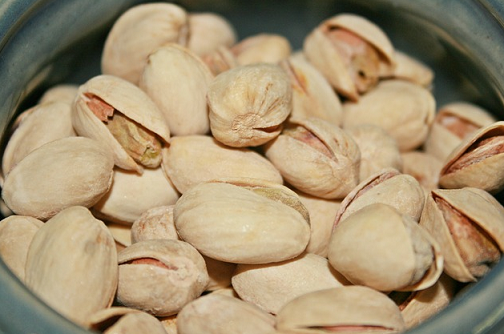
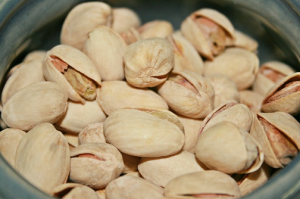

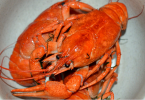

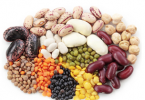

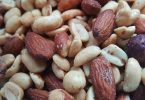
Leave a Comment